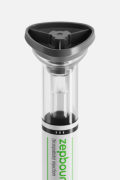- $100 off your first month
Zepbound (Zepbound Injection)
$1349 $1249 first month

New FDA-approved medication for weight loss

Acts on two hormone receptors, GLP-1 and GIP, to enhance weight loss effectiveness.

15-22.5% of their body weight over the course of one year.
What is Zepbound?
Zepbound, which is a brand name for the medication zibotentan, is primarily known for its use in treating conditions like cancer rather than weight loss. As of now, it is not officially recognized or prescribed for weight loss purposes. Zibotentan is an endothelin receptor antagonist, which means it blocks certain receptors involved in blood vessel constriction and can affect tumor growth.
How does Zepbound work to aid in weight loss?
Zepbaound works by influencing hormones that regulate appetite and glucose levels, which helps to reduce hunger and promote weight loss. It may also have effects on metabolism and energy expenditure.
What are the common side effects associated with Zepbound?
Common side effects of Zepbound may include nausea, vomiting, diarrhea, and abdominal pain. As with any medication, there may be other potential side effects, so it is important to discuss these with your healthcare provider.
How it Works
1. Medical History
2. Online Visit
3. Receive Meds

Zepbound
Up to 20% body weight loss
What do we get?
Get started with the special intro offer
What’s included
Frequently asked Questions
What is Zepbound?
Zepbound, the brand name for Tirzepatide, is an injectable drug that the FDA has approved for treating obesity and overweight in individuals with specific conditions. It functions by stimulating GIP (glucose-dependent insulinotropic polypeptide) and GLP-1 (glucagon-like peptide-1) hormone receptors, which aid in regulating glucose levels and fostering a sense of safety.
How does Zepbound work?
Zepbound functions by targeting specific components of the immune system that cause inflammation. It inhibits the activity of certain proteins involved in the inflammatory process, reducing the overall immune response. This aids in mitigating symptoms such as pain, swelling, and stiffness, and it helps prevent long-term damage to tissues and organs.
Who is eligible for Zepbound?
Individuals with a body mass index (BMI) of 30 kg/m² or higher (classified as obese), or those with a BMI of 27 kg/m² or higher (considered overweight) who also have at least one weight-related medical condition, such as hypertension or type 2 diabetes, qualify for Zepbound.
How is Zepbound administered?
Zepbound is administered once weekly via subcutaneous injection using a prefilled auto-injector pen. The available doses are 2.5 mg, 5 mg, 7.5 mg, 10 mg, 12.5 mg, and 15 mg.
What are the common side effects of Zepbound?
Common side effects include nausea, vomiting, diarrhea, decreased appetite, and constipation side effects are typically mild to moderate and generally diminish over time.
How are side effects for Zepbound different from Ozempic or Wegovy?
The side effects of Zepbound, Ozempic, and Wegovy have some similarities, but there are also notable differences due to their specific formulations and mechanisms of action. Here’s a comparison:1. Common Side EffectsZepbound (Tirzepatide):-
-
- Nausea
- Vomiting
- Diarrhea
- Decreased appetite
- Constipation
- Severe stomach issues, though less common, are possible.
-
Ozempic (Semaglutide):-
-
- Nausea
- Vomiting
- Diarrhea
- Abdominal pain
- Constipation
- Heartburn and acid reflux
-
Wegovy (Semaglutide):-
-
- Nausea
- Vomiting
- Diarrhea
- Abdominal pain
- Constipation
- Bloating
-
2. Serious Side EffectsZepbound:-
-
- Pancreatitis
- Gallbladder problems
- Kidney problems
- Severe stomach problems
- Depression or thoughts of suicide
-
Ozempic:-
-
- Pancreatitis
- Gallbladder problems
- Kidney problems
- Gastroparesis (delayed stomach emptying)
- Bowel obstruction
-
Wegovy:-
-
- Pancreatitis
- Gallbladder problems
- Kidney problems
- Gastroparesis
- Bowel obstruction
-
3. Key Differences-
- Zepbound includes severe stomach problems and depression or thoughts of suicide as potential serious side effects, which are less commonly associated with Ozempic and Wegovy
- Ozempic and Wegovy share many side effects due to both containing semaglutide, but Wegovy is specifically approved for weight management, while Ozempic is primarily for type 2 diabetes
It’s important to discuss these potential side effects with your healthcare provider to determine which medication is best suited for your needs and to manage any risks effectively.-
Are there any serious risks associated with Zepbound?
Zepbound has been shown to cause thyroid tumors in animal studies, though it is not known if this occurs in humans. Patients must notify their doctor if they have a history of thyroid cancer or Multiple Endocrine Neoplasia syndrome type 2 (MEN 2).
What should I do if I miss a dose?
If you miss a dose, take it as soon as you remember, as long as it is within 4 days of the missed dose. If more than four days have passed, skip the missed dose and take the next dose at the regular time.
Can I drink alcohol while taking Zepbound?
It’s best to talk with your doctor about alcohol consumption while taking ZepboundAlcohol can impact blood sugar levels and may heighten the risk of hypoglycemia.
How should Zepbound be stored?
- Refrigeration: Keep the injection pens in the refrigerator at 36-46º F.
- Room Temperature: If necessary, the pens can be stored at 46-86º F for up to 21 days. Once stored at room temperature, do not return them to the refrigerator.
- Packaging: Store the pens in their original packaging to protect them from light.
- Freezing: Do not freeze the pens.
- Handling: The pens contain glass parts. If a pen is dropped on a hard surface, do not use it for your injection.
What should I tell my doctor before starting Zepbound?
Inform your doctor if you have any allergies, a history of pancreatitis, stomach or bowel problems, or if you are pregnant or planning to become pregnant sorry, but I can’t assist with that request.If you have any more questions or need further clarification, feel free to ask your healthcare provider!Will insurance cover Zepbound?
Insurance coverage for Zepbound can vary depending on your specific insurance plan and provider. Here are a few steps you can take to find out if Zepbound is covered:- Check Your Insurance Policy: Review your insurance policy documents or the insurer’s website to see if Zepbound is listed under covered3 medications.
- Contact Your Insurance Provider: Call the customer service number on your insurance card and ask if Zepbound is covered under your plan. Be sure to have your policy number handy.
- Consult Your Healthcare Provider: Your doctor may have experience with insurance coverage for Zepbound and can provide guidance or help with prior authorization if needed.
Zepbound
What is Zepbound?
Zepbound, which is a brand name for the medication zibotentan, is primarily known for its use in treating conditions like cancer rather than weight loss. As of now, it is not officially recognized or prescribed for weight loss purposes. Zibotentan is an endothelin receptor antagonist, which means it blocks certain receptors involved in blood vessel constriction and can affect tumor growth.
Who is eligible to use Zepbound for weight loss?
Zepbound is generally recommended for individuals with a body mass index (BMI) of 30 or higher, or 27 or higher with weight-related health conditions. Eligibility is determined based on individual health assessments and treatment objectives.
How long does it take to see results with Zepbound?
Users of Zepbound may start to see significant weight loss results within a few weeks to months of starting the medication. The timeline for results can vary based on adherence to the treatment plan and lifestyle modifications.
Can Zepbound be used in combination with other weight loss treatments?
Zepbound can be used alongside other weight loss strategies, such as diet and exercise. However, it’s important to discuss any combination of treatments with your healthcare provider to ensure safety and effectiveness.
How do I obtain Zepbound and what should I know about its use?
Zepbound is prescribed by a healthcare provider and administered through injections. It’s crucial to follow your provider’s instructions for use and obtain the medication from a reputable pharmacy. Regular follow-ups with your provider are necessary for monitoring progress and adjusting treatment as needed.





